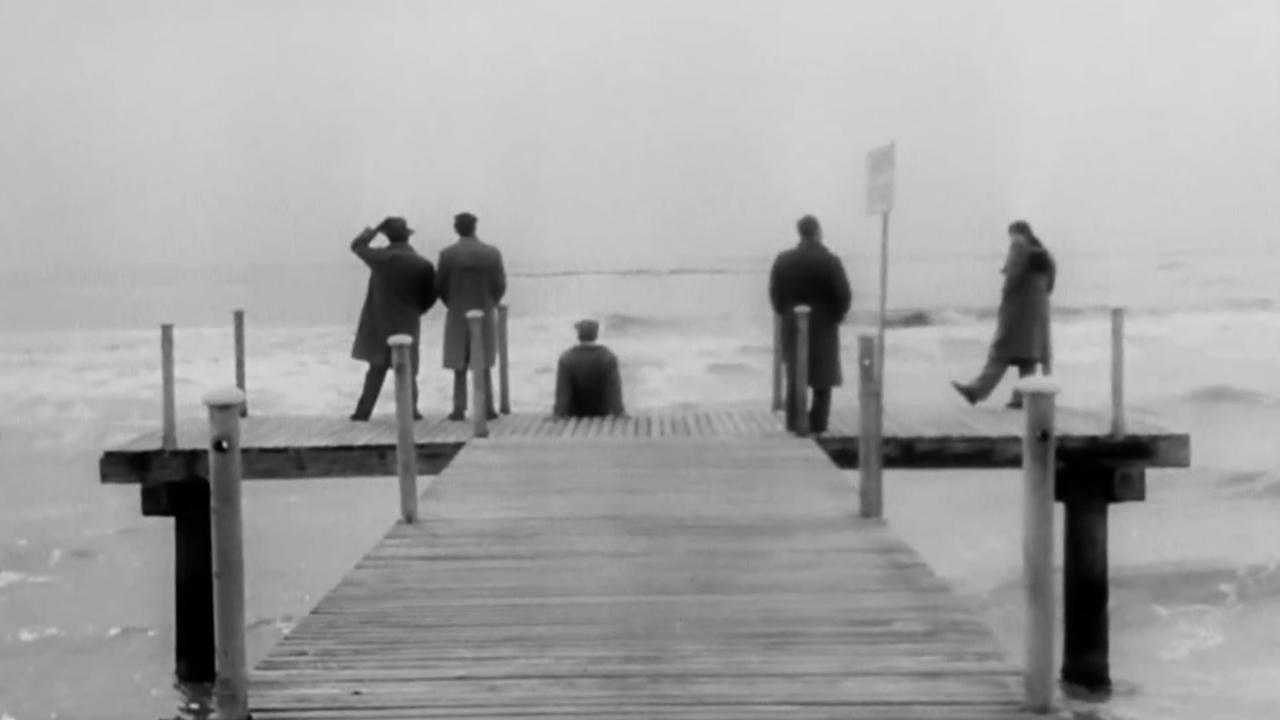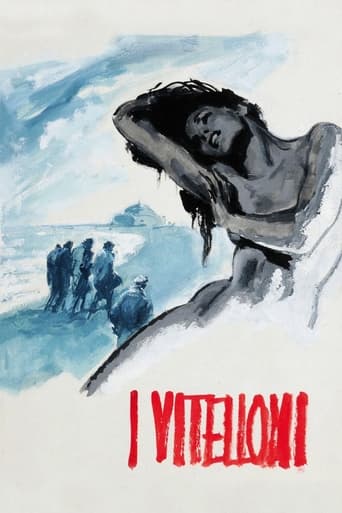Stellead
Don't listen to the Hype. It's awful
Glucedee
It's hard to see any effort in the film. There's no comedy to speak of, no real drama and, worst of all.
Roman Sampson
One of the most extraordinary films you will see this year. Take that as you want.
Brennan Camacho
Mostly, the movie is committed to the value of a good time.
petra_ste
Here's an example of why this movie - admired by Kubrick and Scorsese and following five young deadbeats roaming around a small Italian city - is great.One of our protagonists, Fausto, is fiercely berated by his stern father. Fausto's girlfriend (sort of) is pregnant and the young man - who fancies himself to be a casanova - must marry her to save her honor (and his own family's). Humiliated, he leaves the house and finds his friends waiting for him in the dark street outside. They've heard everything and stand there looking at him, all awkward and sympathetic... and suddenly burst into a colossal laugh.No matter how realistic, most movies have a certain conventional, staged quality to them; few manage to portray small moments as vivid as the little bit of schadenfreude I mentioned above, or as other scenes showing how sad parties get late at night, how creepy a meeting with a near-stranger can be, how much resentment boils beneath the surface even between friends. Each one of the five heroes eventually faces troubles and humiliations, a darker undertone showing through the cracks of the light facade.Featuring an iconic scene with a young Alberto Sordi gesturing obscenely to a group of road workers before his car sputters and stops next to them, to his terrified dismay.9/10
Tim Kidner
There seems to be many 'literal' translations for I Viletoni. The Young (Fatted) Calves a popular one, meaning spoilt young men. For me, though, their swooning and parading, showing off and dis-regard for authority and discipline veers me to that other show-off: the buck.What struck me immediately was the sumptuous photography, set design and even then, Fellini's night-time street scenes are full of lighted magic and intrigue. Only in these sorts of Italian films do you want to step out into the night and join these characters - most other directors portray their nocturnal going-ons as seedy, no-go, dangerous places.The four central characters are exsquitedly well groomed, especially Fausto, the womaniser. For unemployed layabouts (Fausto briefly found work in a religious curio shop) he is one sharp dude, who looked to me strikingly like Richard Burton - and indeed, Sandra, his long suffering wife, as Elizabeth Taylor. I couldn't help comparing the domesticity to the British kitchen sink dramas of the '60s, or even the odd early Bergman. I also felt some of Preston Sturge's influences may have been bestowed on Mr Fellini. I totally see where Marty Scorsese gets his influence from, especially in his Mean Streets. You can almost tick off which character would be which, but being the great man he is, naturally updated it, transferred it and made those night-times daring and dangerous. The scene where they all go by train out into the country and argue as to which bird is in song, reminded me of a similar one in Trainspotting. Of course, the despairing arguments in that one are of a rather more spurious and coarse nature! The Carnival scene is superbly exuberant, full of 'colour' and pizazz. You can almost hear the buzz and crackle and laughter. When Fausto helps his drunk friend home, much to the annoyance of Sandra recalled another Italian tradition - the love of your 'brother' (or friend) over that of any woman, whether she be wife or not. That spills over and continues with Scorsese to this day. The ending too, has the emerging hallmarks of Fellini - thought provoking, complentative, still. But, for me, this isn't Fellini's greatest. More concise and focused than the (often) rambling La Dolce Vita, but where I prefer Scorsese's Taxi Driver over Mean Streets, I yearn for more of a story and unfolding narrative than pure character study, however well done. I enjoy Fellini's allegorical ding-bats and his opening up of the hypocrisies of religious tradition. You don't get those in I Vitelloni.Sharply observed and styled, definitely; ultimately satisfying? Not totally.
jotix100
It came as a total surprise finding this film on a cable channel recently. Not having seen it in quite a while, we decided to watch it again. ¨I vitelloni¨ is one of Fellini's classics that one can see from time to time and still find new things in it. This was Federico Fellini's third work as a director, although his connection with the Italian cinema went way back, because let's not forget he had a glorious career as a screen writer for the likes of Roberto Rosellini, Pietro Germi and Alberto Lattuada, among others.The reigning style of that era was the neorealism, which is reflected in the way Fellini dealt with the central story. That movement liberated movie directors from filming in a studio, as most of their films were shot on actual locations. Italy at the time was going through a terrible time after their defeat in WWII. Unemployment was rampant, something that is easy to understand in the way ¨I vitelloni¨ got involved in bringing out the problems .We are taken to a small town where a group of five young men try to while away their time since no jobs are available to them. There is Fausto, the handsome man who has impregnated his girlfriend and is bound by honor to marry Sandra. Leopoldo, an aspiring playwright lives in a fantasy world, having fallen in love with the maid from the house next door. Alberto, relies on his sister Giulia, who works in the local newspaper, for pocket money. Finally, Riccardo, appears to be the most grounded member of the gang, goes along for the fun they have being together. Moraldo, who becomes Fausto's brother-in-law, acts as the conscience of these aimless men; he is the only one that has the courage to leave the small town.Fellini collaborated in this film with Tulio Pinelli, a genius in his own right, and Ennio Flaiano, to create a story that was relevant as it depicted the times their country was living. Fellini was blessed in that he worked at the time when he could rely on someone of the caliber of Nino Rota to work on the musical score that serves his picture in unexpected ways. The cinematography was shared by three of Italy's leading cameramen, Carlo Carlini, Otello Martelli and Luciano Trasatti; they captured the town just as probably Fellini wanted it to look.The acting is dominated by Franco Fabrizi who plays Fausto. With his good looks, it's easy to see him as the vain man who wanted to satisfy his desires in whatever way he can. Leopoldo Trieste makes an impression with his 'Poldo, a pathetic figure living with his head in the clouds. Alberto Sordi, who had worked with Fellini in ¨The White Sheik¨, has a small part as Alberto. His scene at the carnival ball when he dresses up as a woman, goes from funny to tragic as he runs into his sister who has decided to run away with her lover. Franco Interlenghi makes the most out of his Moraldo.¨I vitelloni¨ is highly recommended to all fans of the Italian cinema golden years, and specially to Federico Fellini's admirers who will not be disappointed with this minor masterpiece.
preppy-3
An early autobiographical film by Fellini. It's about five aimless youths growing up in a small town in Italy. They have no direction in life and seem to be unable to act like adults. Their leader Fausto (Franco Fabrizi) gets a girl pregnant and is forced into marriage. The film mostly deals with his life and how he struggles to become an adult. Moraldo (Franco Interlenghi) is the narrator--and the filmmaker himself.Moving and funny--a beautiful comedy drama. The imagery is just incredible (as in all Fellini films) but he has a story to tell. Some of his later films sacrificed the story for images--here the story comes first. The plot is familiar but all the acting is good, the black and white cinematography is gorgeous and there's a beautiful music score (by the then unknown Nino Rota). I was reluctant to see this film at first (I'm not a Fellini fan) but in no time I was swept away by the story and characters. Easily one of the best foreign films I've ever seen and some consider this Fellini's masterpiece. Well worth catching.

